FdSc Psychological & Social Science: Theories & Ethics in Health Care
VerifiedAdded on 2023/06/18
|10
|2188
|341
Essay
AI Summary
This essay provides an analysis of key sociological and psychological theories and their application to health and social care. It explores sociological perspectives to explain cultural and ethical issues, such as patient rights, inequality, race, ethnicity, and gender, within the health and social care sector. The essay also applies ethical perspectives to the diversity of values associated with health and well-being, including confidentiality and informed consent. The study concludes that managing social environments and patient behavior is crucial for improving health outcomes, emphasizing patient respect and safety in care practices. This assignment was completed for the FdSc Supporting Innovation in Health and Social Care course at LSC London, and similar papers are available on Desklib.
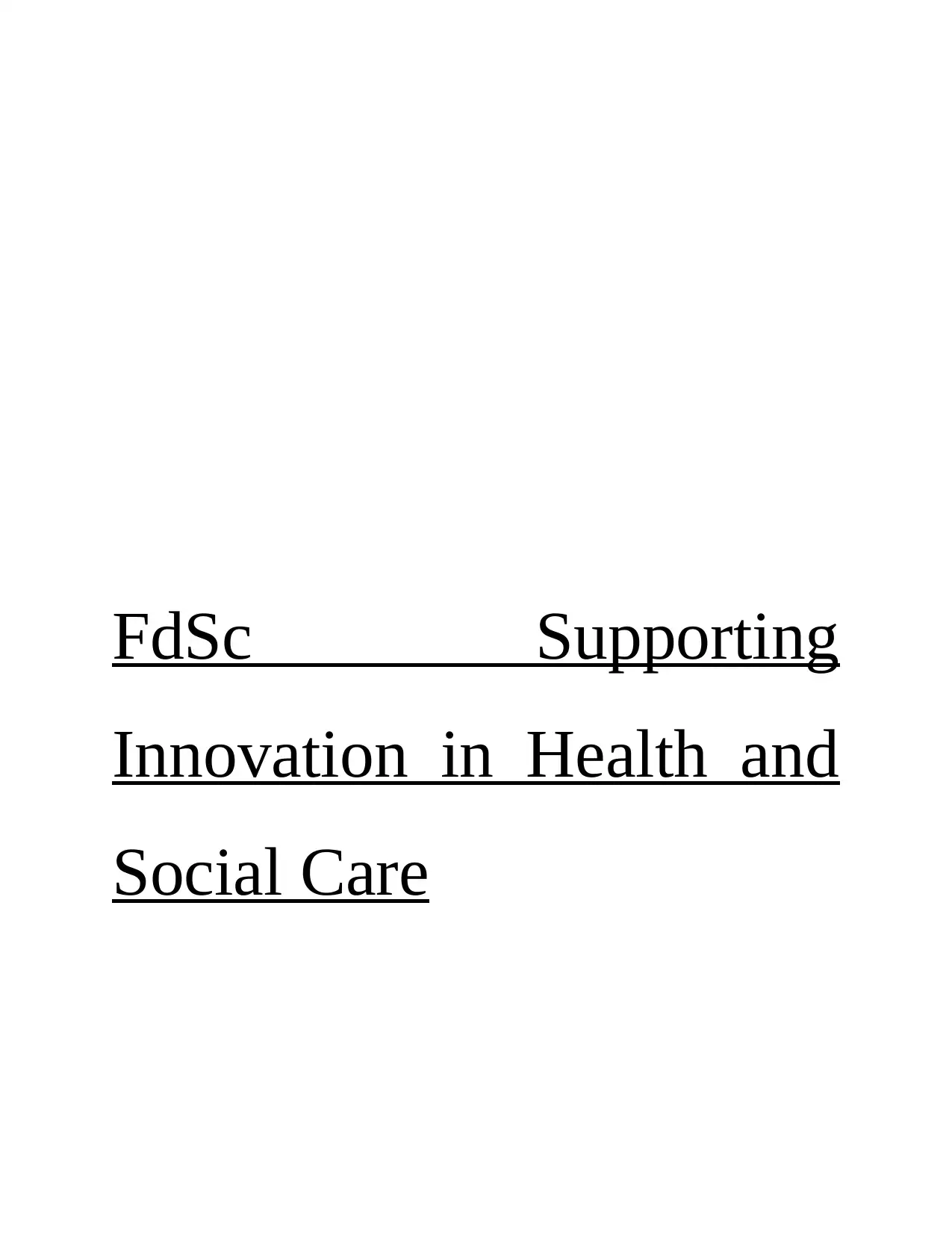
FdSc Supporting
Innovation in Health and
Social Care
Innovation in Health and
Social Care
Paraphrase This Document
Need a fresh take? Get an instant paraphrase of this document with our AI Paraphraser
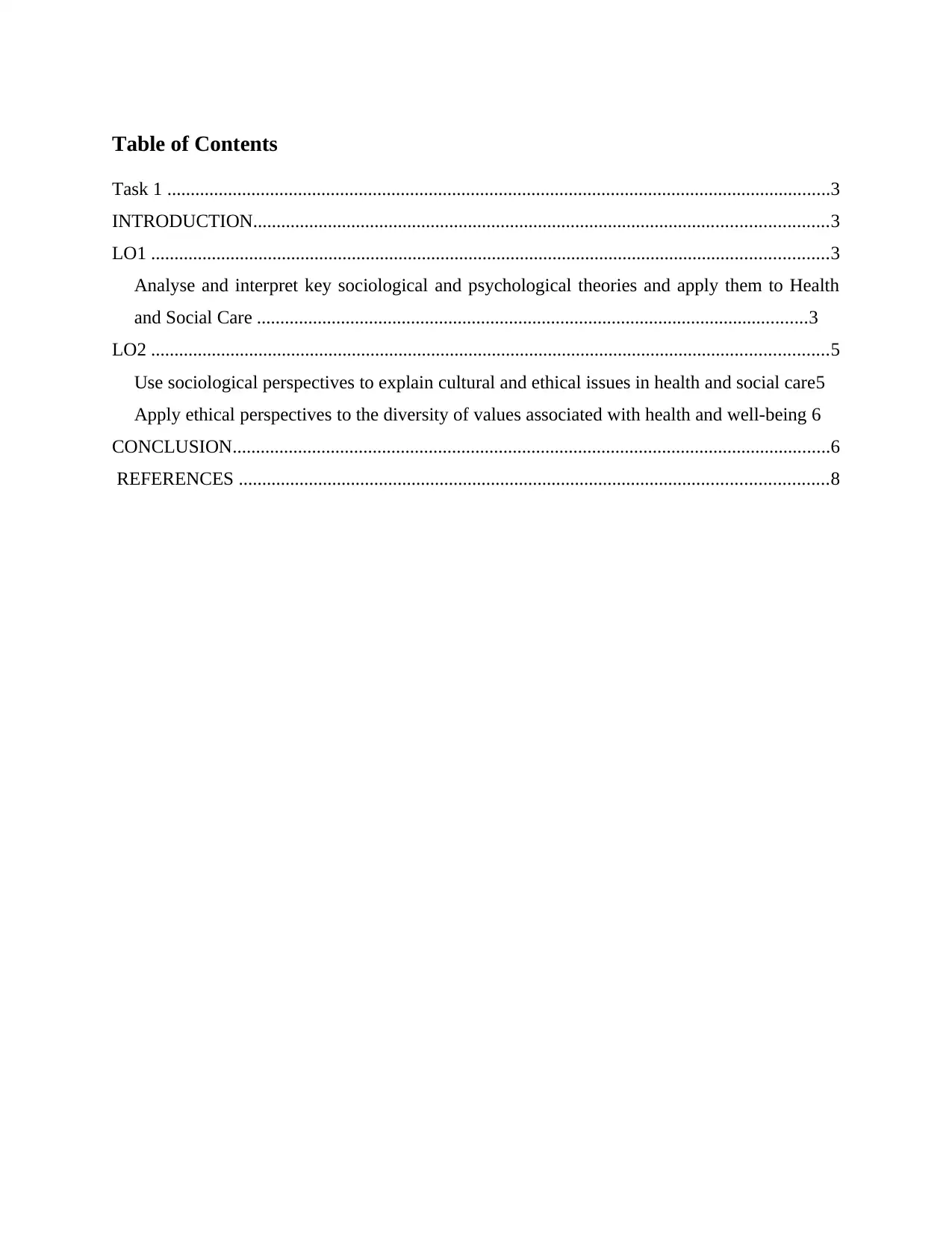
Table of Contents
Task 1 ..............................................................................................................................................3
INTRODUCTION...........................................................................................................................3
LO1 .................................................................................................................................................3
Analyse and interpret key sociological and psychological theories and apply them to Health
and Social Care ......................................................................................................................3
LO2 .................................................................................................................................................5
Use sociological perspectives to explain cultural and ethical issues in health and social care5
Apply ethical perspectives to the diversity of values associated with health and well-being 6
CONCLUSION................................................................................................................................6
REFERENCES ..............................................................................................................................8
Task 1 ..............................................................................................................................................3
INTRODUCTION...........................................................................................................................3
LO1 .................................................................................................................................................3
Analyse and interpret key sociological and psychological theories and apply them to Health
and Social Care ......................................................................................................................3
LO2 .................................................................................................................................................5
Use sociological perspectives to explain cultural and ethical issues in health and social care5
Apply ethical perspectives to the diversity of values associated with health and well-being 6
CONCLUSION................................................................................................................................6
REFERENCES ..............................................................................................................................8
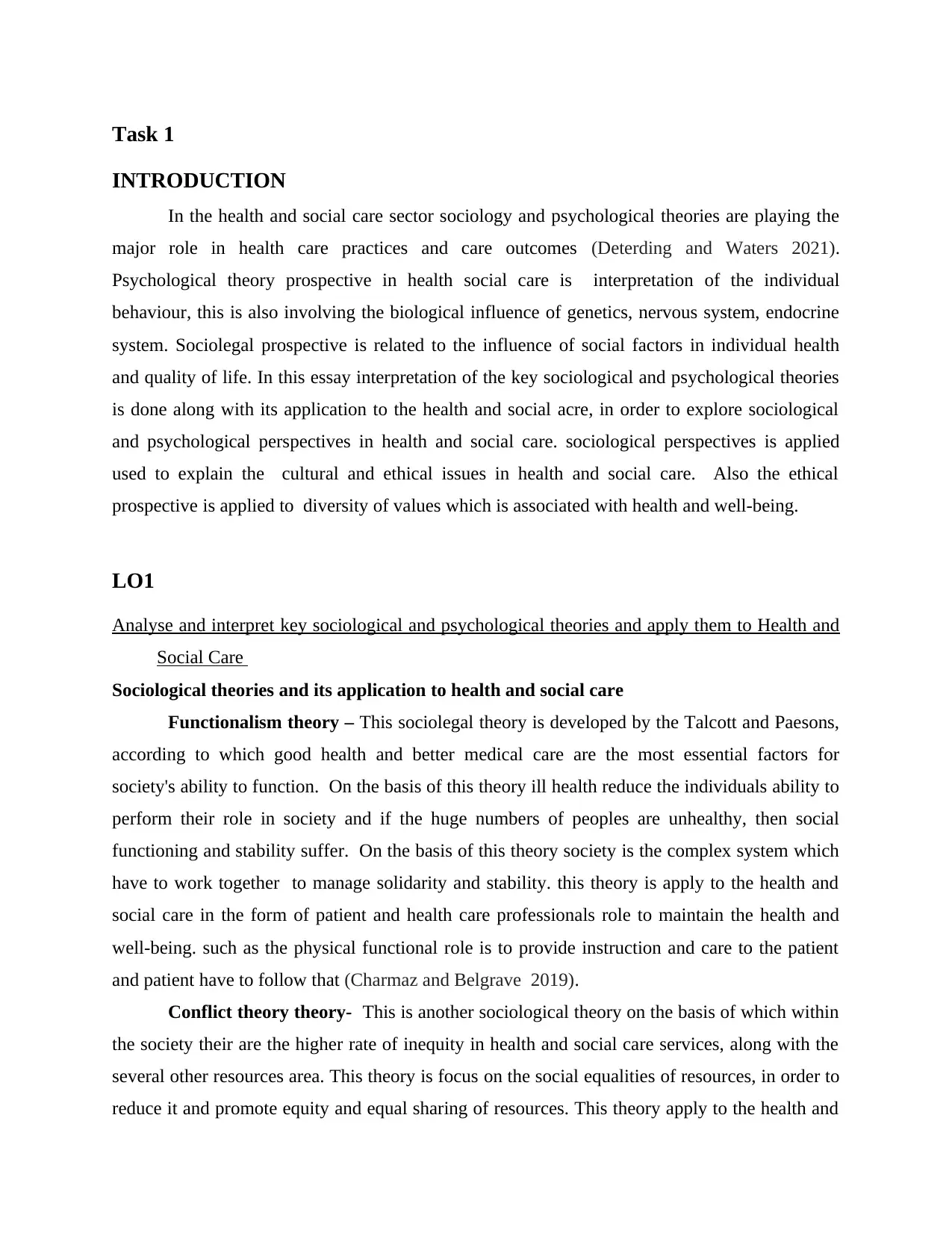
Task 1
INTRODUCTION
In the health and social care sector sociology and psychological theories are playing the
major role in health care practices and care outcomes (Deterding and Waters 2021).
Psychological theory prospective in health social care is interpretation of the individual
behaviour, this is also involving the biological influence of genetics, nervous system, endocrine
system. Sociolegal prospective is related to the influence of social factors in individual health
and quality of life. In this essay interpretation of the key sociological and psychological theories
is done along with its application to the health and social acre, in order to explore sociological
and psychological perspectives in health and social care. sociological perspectives is applied
used to explain the cultural and ethical issues in health and social care. Also the ethical
prospective is applied to diversity of values which is associated with health and well-being.
LO1
Analyse and interpret key sociological and psychological theories and apply them to Health and
Social Care
Sociological theories and its application to health and social care
Functionalism theory – This sociolegal theory is developed by the Talcott and Paesons,
according to which good health and better medical care are the most essential factors for
society's ability to function. On the basis of this theory ill health reduce the individuals ability to
perform their role in society and if the huge numbers of peoples are unhealthy, then social
functioning and stability suffer. On the basis of this theory society is the complex system which
have to work together to manage solidarity and stability. this theory is apply to the health and
social care in the form of patient and health care professionals role to maintain the health and
well-being. such as the physical functional role is to provide instruction and care to the patient
and patient have to follow that (Charmaz and Belgrave 2019).
Conflict theory theory- This is another sociological theory on the basis of which within
the society their are the higher rate of inequity in health and social care services, along with the
several other resources area. This theory is focus on the social equalities of resources, in order to
reduce it and promote equity and equal sharing of resources. This theory apply to the health and
INTRODUCTION
In the health and social care sector sociology and psychological theories are playing the
major role in health care practices and care outcomes (Deterding and Waters 2021).
Psychological theory prospective in health social care is interpretation of the individual
behaviour, this is also involving the biological influence of genetics, nervous system, endocrine
system. Sociolegal prospective is related to the influence of social factors in individual health
and quality of life. In this essay interpretation of the key sociological and psychological theories
is done along with its application to the health and social acre, in order to explore sociological
and psychological perspectives in health and social care. sociological perspectives is applied
used to explain the cultural and ethical issues in health and social care. Also the ethical
prospective is applied to diversity of values which is associated with health and well-being.
LO1
Analyse and interpret key sociological and psychological theories and apply them to Health and
Social Care
Sociological theories and its application to health and social care
Functionalism theory – This sociolegal theory is developed by the Talcott and Paesons,
according to which good health and better medical care are the most essential factors for
society's ability to function. On the basis of this theory ill health reduce the individuals ability to
perform their role in society and if the huge numbers of peoples are unhealthy, then social
functioning and stability suffer. On the basis of this theory society is the complex system which
have to work together to manage solidarity and stability. this theory is apply to the health and
social care in the form of patient and health care professionals role to maintain the health and
well-being. such as the physical functional role is to provide instruction and care to the patient
and patient have to follow that (Charmaz and Belgrave 2019).
Conflict theory theory- This is another sociological theory on the basis of which within
the society their are the higher rate of inequity in health and social care services, along with the
several other resources area. This theory is focus on the social equalities of resources, in order to
reduce it and promote equity and equal sharing of resources. This theory apply to the health and
⊘ This is a preview!⊘
Do you want full access?
Subscribe today to unlock all pages.

Trusted by 1+ million students worldwide
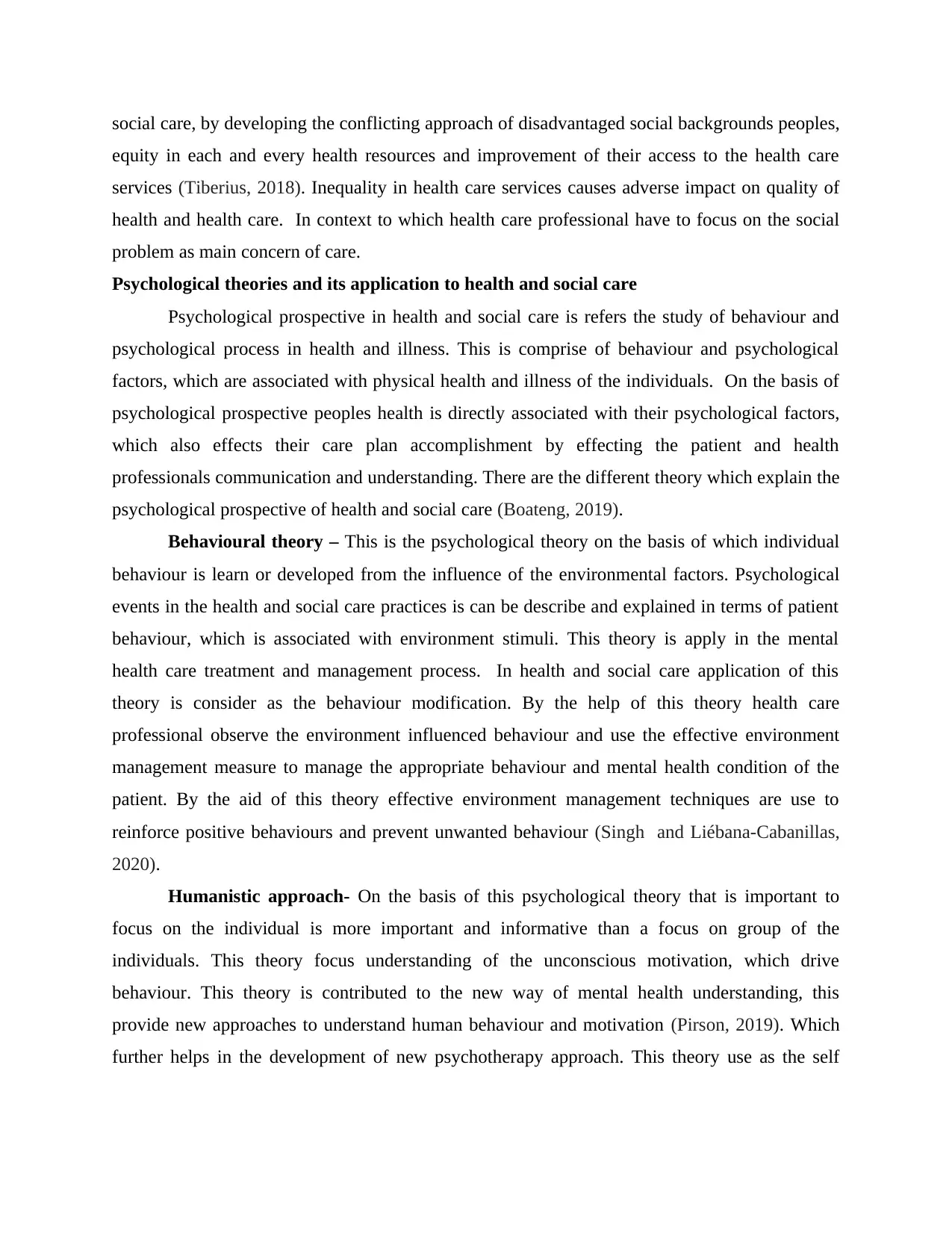
social care, by developing the conflicting approach of disadvantaged social backgrounds peoples,
equity in each and every health resources and improvement of their access to the health care
services (Tiberius, 2018). Inequality in health care services causes adverse impact on quality of
health and health care. In context to which health care professional have to focus on the social
problem as main concern of care.
Psychological theories and its application to health and social care
Psychological prospective in health and social care is refers the study of behaviour and
psychological process in health and illness. This is comprise of behaviour and psychological
factors, which are associated with physical health and illness of the individuals. On the basis of
psychological prospective peoples health is directly associated with their psychological factors,
which also effects their care plan accomplishment by effecting the patient and health
professionals communication and understanding. There are the different theory which explain the
psychological prospective of health and social care (Boateng, 2019).
Behavioural theory – This is the psychological theory on the basis of which individual
behaviour is learn or developed from the influence of the environmental factors. Psychological
events in the health and social care practices is can be describe and explained in terms of patient
behaviour, which is associated with environment stimuli. This theory is apply in the mental
health care treatment and management process. In health and social care application of this
theory is consider as the behaviour modification. By the help of this theory health care
professional observe the environment influenced behaviour and use the effective environment
management measure to manage the appropriate behaviour and mental health condition of the
patient. By the aid of this theory effective environment management techniques are use to
reinforce positive behaviours and prevent unwanted behaviour (Singh and Liébana-Cabanillas,
2020).
Humanistic approach- On the basis of this psychological theory that is important to
focus on the individual is more important and informative than a focus on group of the
individuals. This theory focus understanding of the unconscious motivation, which drive
behaviour. This theory is contributed to the new way of mental health understanding, this
provide new approaches to understand human behaviour and motivation (Pirson, 2019). Which
further helps in the development of new psychotherapy approach. This theory use as the self
equity in each and every health resources and improvement of their access to the health care
services (Tiberius, 2018). Inequality in health care services causes adverse impact on quality of
health and health care. In context to which health care professional have to focus on the social
problem as main concern of care.
Psychological theories and its application to health and social care
Psychological prospective in health and social care is refers the study of behaviour and
psychological process in health and illness. This is comprise of behaviour and psychological
factors, which are associated with physical health and illness of the individuals. On the basis of
psychological prospective peoples health is directly associated with their psychological factors,
which also effects their care plan accomplishment by effecting the patient and health
professionals communication and understanding. There are the different theory which explain the
psychological prospective of health and social care (Boateng, 2019).
Behavioural theory – This is the psychological theory on the basis of which individual
behaviour is learn or developed from the influence of the environmental factors. Psychological
events in the health and social care practices is can be describe and explained in terms of patient
behaviour, which is associated with environment stimuli. This theory is apply in the mental
health care treatment and management process. In health and social care application of this
theory is consider as the behaviour modification. By the help of this theory health care
professional observe the environment influenced behaviour and use the effective environment
management measure to manage the appropriate behaviour and mental health condition of the
patient. By the aid of this theory effective environment management techniques are use to
reinforce positive behaviours and prevent unwanted behaviour (Singh and Liébana-Cabanillas,
2020).
Humanistic approach- On the basis of this psychological theory that is important to
focus on the individual is more important and informative than a focus on group of the
individuals. This theory focus understanding of the unconscious motivation, which drive
behaviour. This theory is contributed to the new way of mental health understanding, this
provide new approaches to understand human behaviour and motivation (Pirson, 2019). Which
further helps in the development of new psychotherapy approach. This theory use as the self
Paraphrase This Document
Need a fresh take? Get an instant paraphrase of this document with our AI Paraphraser
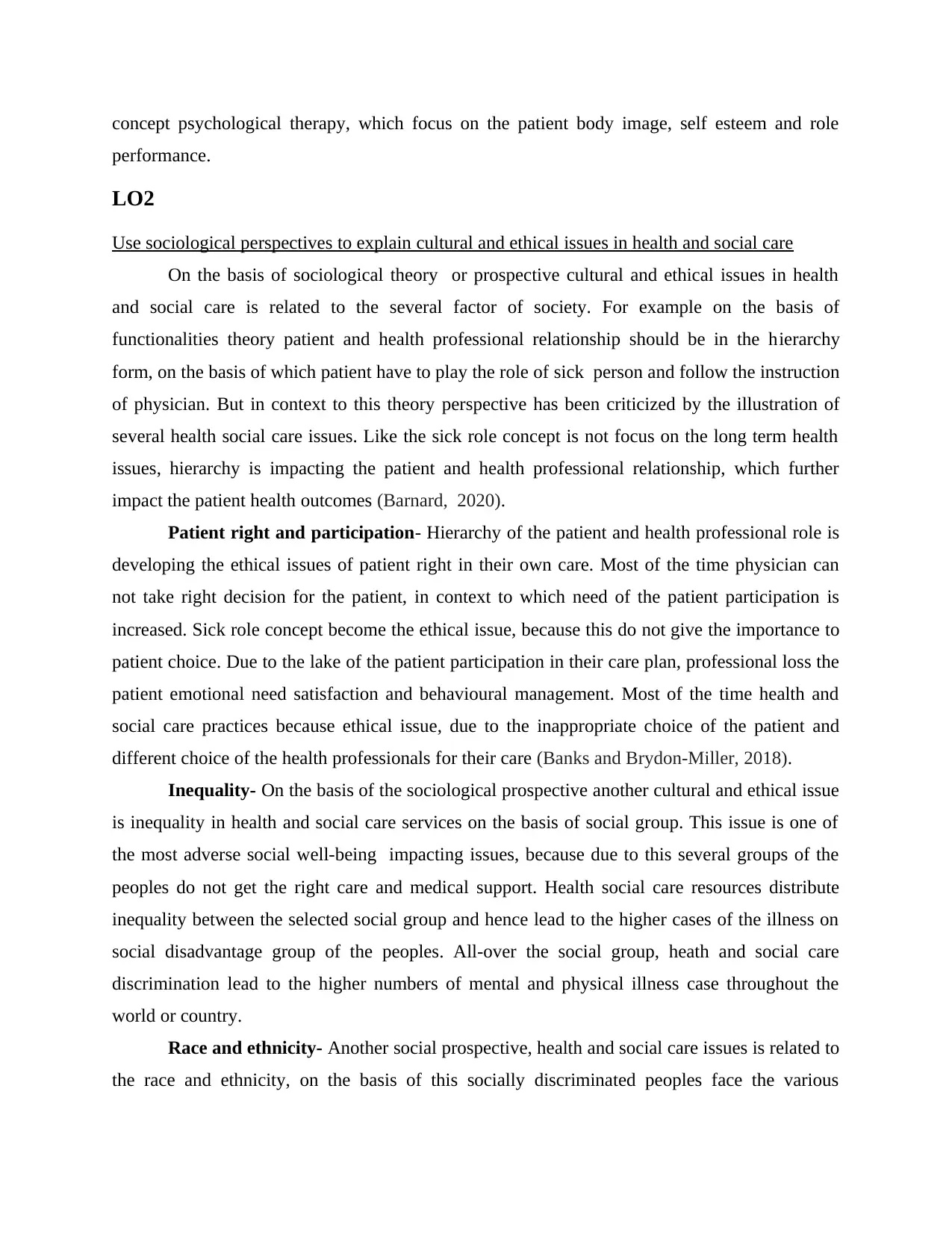
concept psychological therapy, which focus on the patient body image, self esteem and role
performance.
LO2
Use sociological perspectives to explain cultural and ethical issues in health and social care
On the basis of sociological theory or prospective cultural and ethical issues in health
and social care is related to the several factor of society. For example on the basis of
functionalities theory patient and health professional relationship should be in the hierarchy
form, on the basis of which patient have to play the role of sick person and follow the instruction
of physician. But in context to this theory perspective has been criticized by the illustration of
several health social care issues. Like the sick role concept is not focus on the long term health
issues, hierarchy is impacting the patient and health professional relationship, which further
impact the patient health outcomes (Barnard, 2020).
Patient right and participation- Hierarchy of the patient and health professional role is
developing the ethical issues of patient right in their own care. Most of the time physician can
not take right decision for the patient, in context to which need of the patient participation is
increased. Sick role concept become the ethical issue, because this do not give the importance to
patient choice. Due to the lake of the patient participation in their care plan, professional loss the
patient emotional need satisfaction and behavioural management. Most of the time health and
social care practices because ethical issue, due to the inappropriate choice of the patient and
different choice of the health professionals for their care (Banks and Brydon-Miller, 2018).
Inequality- On the basis of the sociological prospective another cultural and ethical issue
is inequality in health and social care services on the basis of social group. This issue is one of
the most adverse social well-being impacting issues, because due to this several groups of the
peoples do not get the right care and medical support. Health social care resources distribute
inequality between the selected social group and hence lead to the higher cases of the illness on
social disadvantage group of the peoples. All-over the social group, heath and social care
discrimination lead to the higher numbers of mental and physical illness case throughout the
world or country.
Race and ethnicity- Another social prospective, health and social care issues is related to
the race and ethnicity, on the basis of this socially discriminated peoples face the various
performance.
LO2
Use sociological perspectives to explain cultural and ethical issues in health and social care
On the basis of sociological theory or prospective cultural and ethical issues in health
and social care is related to the several factor of society. For example on the basis of
functionalities theory patient and health professional relationship should be in the hierarchy
form, on the basis of which patient have to play the role of sick person and follow the instruction
of physician. But in context to this theory perspective has been criticized by the illustration of
several health social care issues. Like the sick role concept is not focus on the long term health
issues, hierarchy is impacting the patient and health professional relationship, which further
impact the patient health outcomes (Barnard, 2020).
Patient right and participation- Hierarchy of the patient and health professional role is
developing the ethical issues of patient right in their own care. Most of the time physician can
not take right decision for the patient, in context to which need of the patient participation is
increased. Sick role concept become the ethical issue, because this do not give the importance to
patient choice. Due to the lake of the patient participation in their care plan, professional loss the
patient emotional need satisfaction and behavioural management. Most of the time health and
social care practices because ethical issue, due to the inappropriate choice of the patient and
different choice of the health professionals for their care (Banks and Brydon-Miller, 2018).
Inequality- On the basis of the sociological prospective another cultural and ethical issue
is inequality in health and social care services on the basis of social group. This issue is one of
the most adverse social well-being impacting issues, because due to this several groups of the
peoples do not get the right care and medical support. Health social care resources distribute
inequality between the selected social group and hence lead to the higher cases of the illness on
social disadvantage group of the peoples. All-over the social group, heath and social care
discrimination lead to the higher numbers of mental and physical illness case throughout the
world or country.
Race and ethnicity- Another social prospective, health and social care issues is related to
the race and ethnicity, on the basis of this socially discriminated peoples face the various
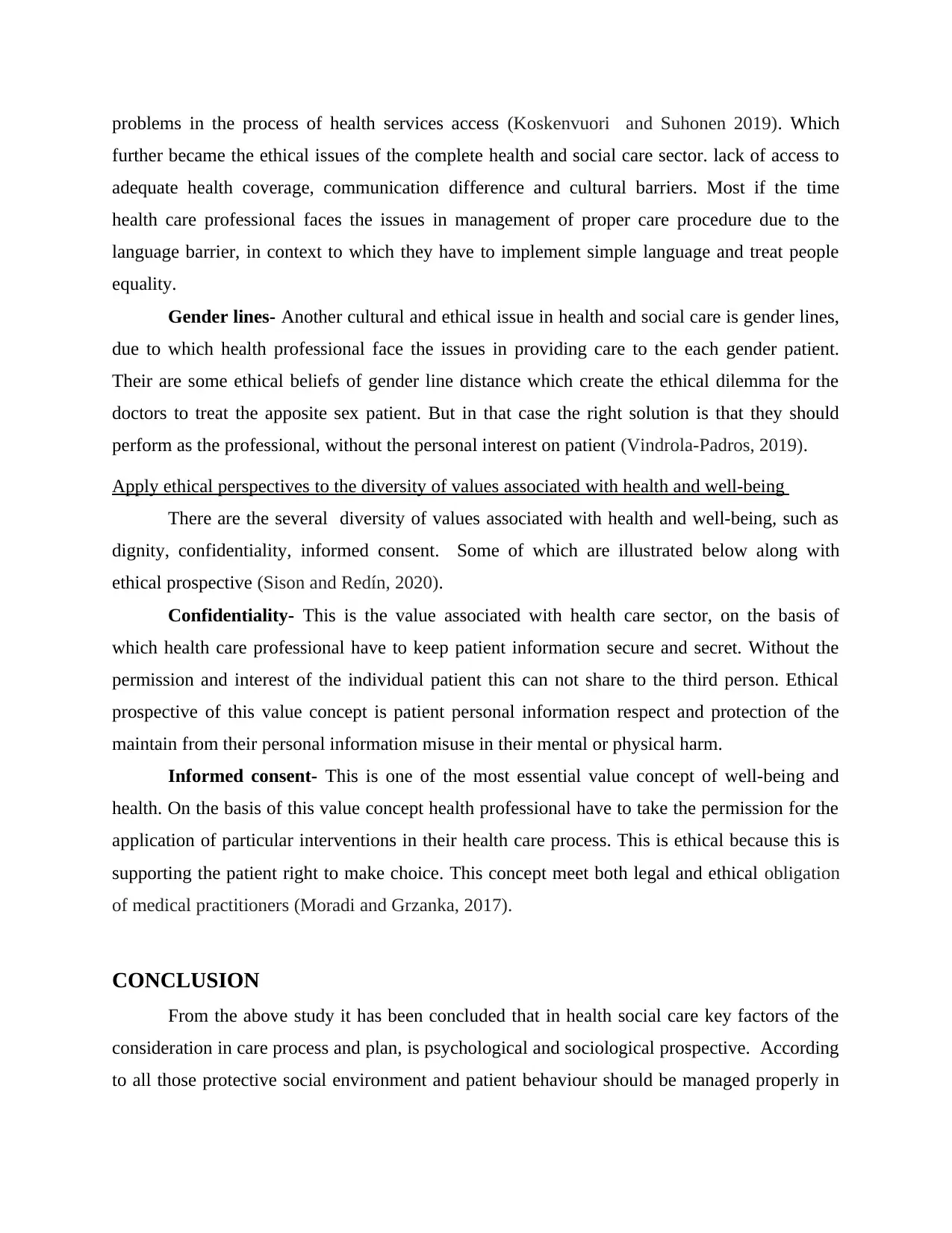
problems in the process of health services access (Koskenvuori and Suhonen 2019). Which
further became the ethical issues of the complete health and social care sector. lack of access to
adequate health coverage, communication difference and cultural barriers. Most if the time
health care professional faces the issues in management of proper care procedure due to the
language barrier, in context to which they have to implement simple language and treat people
equality.
Gender lines- Another cultural and ethical issue in health and social care is gender lines,
due to which health professional face the issues in providing care to the each gender patient.
Their are some ethical beliefs of gender line distance which create the ethical dilemma for the
doctors to treat the apposite sex patient. But in that case the right solution is that they should
perform as the professional, without the personal interest on patient (Vindrola-Padros, 2019).
Apply ethical perspectives to the diversity of values associated with health and well-being
There are the several diversity of values associated with health and well-being, such as
dignity, confidentiality, informed consent. Some of which are illustrated below along with
ethical prospective (Sison and Redín, 2020).
Confidentiality- This is the value associated with health care sector, on the basis of
which health care professional have to keep patient information secure and secret. Without the
permission and interest of the individual patient this can not share to the third person. Ethical
prospective of this value concept is patient personal information respect and protection of the
maintain from their personal information misuse in their mental or physical harm.
Informed consent- This is one of the most essential value concept of well-being and
health. On the basis of this value concept health professional have to take the permission for the
application of particular interventions in their health care process. This is ethical because this is
supporting the patient right to make choice. This concept meet both legal and ethical obligation
of medical practitioners (Moradi and Grzanka, 2017).
CONCLUSION
From the above study it has been concluded that in health social care key factors of the
consideration in care process and plan, is psychological and sociological prospective. According
to all those protective social environment and patient behaviour should be managed properly in
further became the ethical issues of the complete health and social care sector. lack of access to
adequate health coverage, communication difference and cultural barriers. Most if the time
health care professional faces the issues in management of proper care procedure due to the
language barrier, in context to which they have to implement simple language and treat people
equality.
Gender lines- Another cultural and ethical issue in health and social care is gender lines,
due to which health professional face the issues in providing care to the each gender patient.
Their are some ethical beliefs of gender line distance which create the ethical dilemma for the
doctors to treat the apposite sex patient. But in that case the right solution is that they should
perform as the professional, without the personal interest on patient (Vindrola-Padros, 2019).
Apply ethical perspectives to the diversity of values associated with health and well-being
There are the several diversity of values associated with health and well-being, such as
dignity, confidentiality, informed consent. Some of which are illustrated below along with
ethical prospective (Sison and Redín, 2020).
Confidentiality- This is the value associated with health care sector, on the basis of
which health care professional have to keep patient information secure and secret. Without the
permission and interest of the individual patient this can not share to the third person. Ethical
prospective of this value concept is patient personal information respect and protection of the
maintain from their personal information misuse in their mental or physical harm.
Informed consent- This is one of the most essential value concept of well-being and
health. On the basis of this value concept health professional have to take the permission for the
application of particular interventions in their health care process. This is ethical because this is
supporting the patient right to make choice. This concept meet both legal and ethical obligation
of medical practitioners (Moradi and Grzanka, 2017).
CONCLUSION
From the above study it has been concluded that in health social care key factors of the
consideration in care process and plan, is psychological and sociological prospective. According
to all those protective social environment and patient behaviour should be managed properly in
⊘ This is a preview!⊘
Do you want full access?
Subscribe today to unlock all pages.

Trusted by 1+ million students worldwide
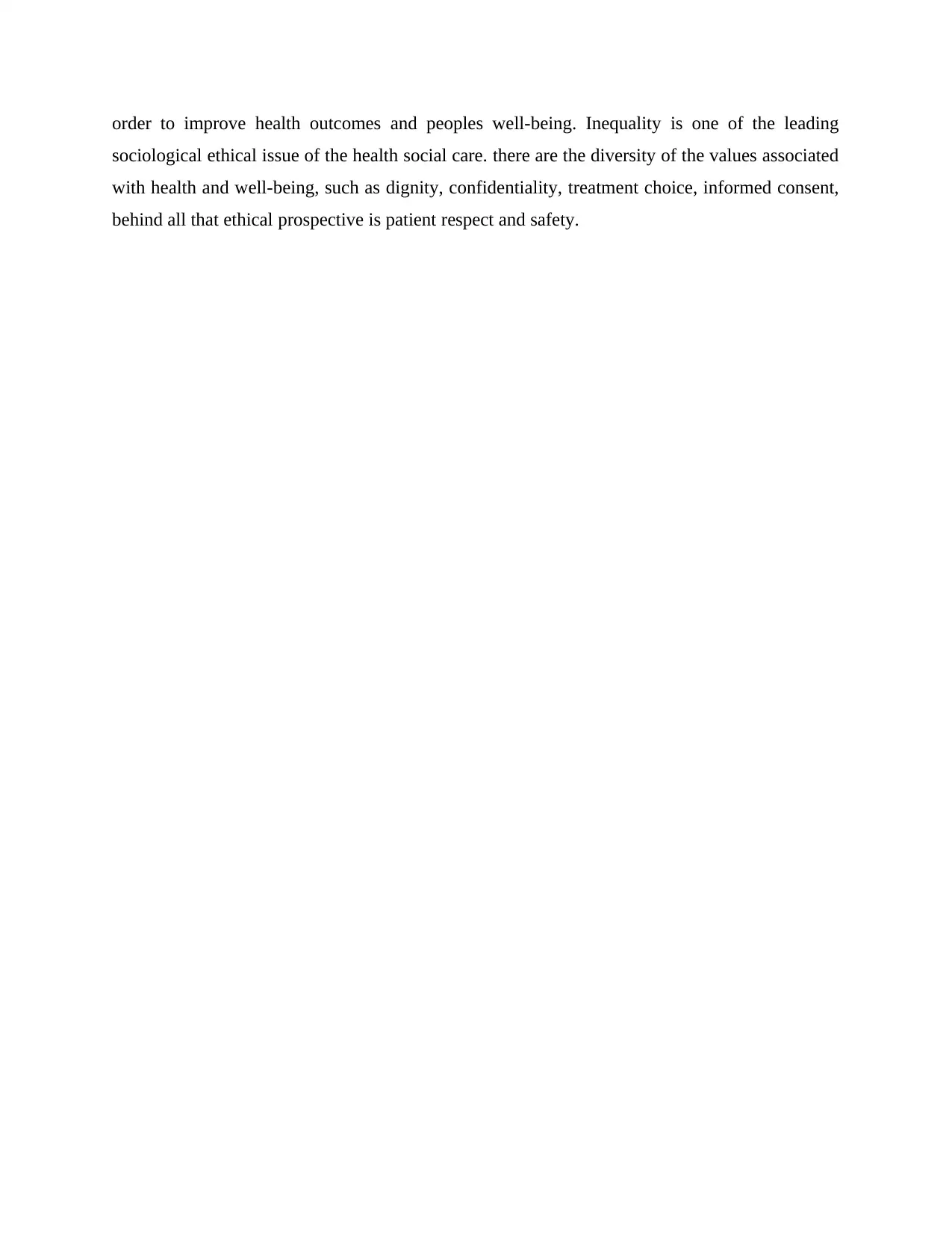
order to improve health outcomes and peoples well-being. Inequality is one of the leading
sociological ethical issue of the health social care. there are the diversity of the values associated
with health and well-being, such as dignity, confidentiality, treatment choice, informed consent,
behind all that ethical prospective is patient respect and safety.
sociological ethical issue of the health social care. there are the diversity of the values associated
with health and well-being, such as dignity, confidentiality, treatment choice, informed consent,
behind all that ethical prospective is patient respect and safety.
Paraphrase This Document
Need a fresh take? Get an instant paraphrase of this document with our AI Paraphraser
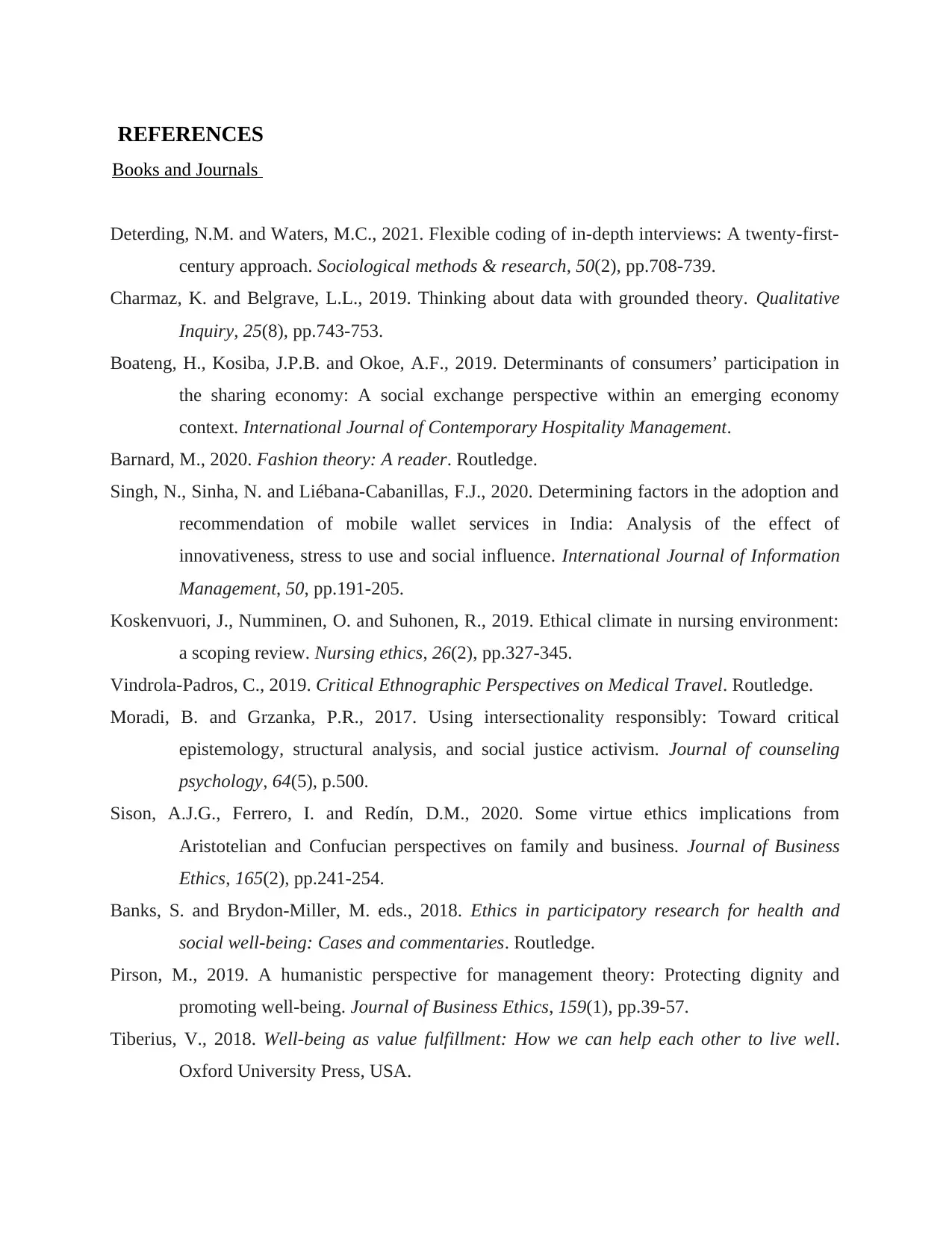
REFERENCES
Books and Journals
Deterding, N.M. and Waters, M.C., 2021. Flexible coding of in-depth interviews: A twenty-first-
century approach. Sociological methods & research, 50(2), pp.708-739.
Charmaz, K. and Belgrave, L.L., 2019. Thinking about data with grounded theory. Qualitative
Inquiry, 25(8), pp.743-753.
Boateng, H., Kosiba, J.P.B. and Okoe, A.F., 2019. Determinants of consumers’ participation in
the sharing economy: A social exchange perspective within an emerging economy
context. International Journal of Contemporary Hospitality Management.
Barnard, M., 2020. Fashion theory: A reader. Routledge.
Singh, N., Sinha, N. and Liébana-Cabanillas, F.J., 2020. Determining factors in the adoption and
recommendation of mobile wallet services in India: Analysis of the effect of
innovativeness, stress to use and social influence. International Journal of Information
Management, 50, pp.191-205.
Koskenvuori, J., Numminen, O. and Suhonen, R., 2019. Ethical climate in nursing environment:
a scoping review. Nursing ethics, 26(2), pp.327-345.
Vindrola-Padros, C., 2019. Critical Ethnographic Perspectives on Medical Travel. Routledge.
Moradi, B. and Grzanka, P.R., 2017. Using intersectionality responsibly: Toward critical
epistemology, structural analysis, and social justice activism. Journal of counseling
psychology, 64(5), p.500.
Sison, A.J.G., Ferrero, I. and Redín, D.M., 2020. Some virtue ethics implications from
Aristotelian and Confucian perspectives on family and business. Journal of Business
Ethics, 165(2), pp.241-254.
Banks, S. and Brydon-Miller, M. eds., 2018. Ethics in participatory research for health and
social well-being: Cases and commentaries. Routledge.
Pirson, M., 2019. A humanistic perspective for management theory: Protecting dignity and
promoting well-being. Journal of Business Ethics, 159(1), pp.39-57.
Tiberius, V., 2018. Well-being as value fulfillment: How we can help each other to live well.
Oxford University Press, USA.
Books and Journals
Deterding, N.M. and Waters, M.C., 2021. Flexible coding of in-depth interviews: A twenty-first-
century approach. Sociological methods & research, 50(2), pp.708-739.
Charmaz, K. and Belgrave, L.L., 2019. Thinking about data with grounded theory. Qualitative
Inquiry, 25(8), pp.743-753.
Boateng, H., Kosiba, J.P.B. and Okoe, A.F., 2019. Determinants of consumers’ participation in
the sharing economy: A social exchange perspective within an emerging economy
context. International Journal of Contemporary Hospitality Management.
Barnard, M., 2020. Fashion theory: A reader. Routledge.
Singh, N., Sinha, N. and Liébana-Cabanillas, F.J., 2020. Determining factors in the adoption and
recommendation of mobile wallet services in India: Analysis of the effect of
innovativeness, stress to use and social influence. International Journal of Information
Management, 50, pp.191-205.
Koskenvuori, J., Numminen, O. and Suhonen, R., 2019. Ethical climate in nursing environment:
a scoping review. Nursing ethics, 26(2), pp.327-345.
Vindrola-Padros, C., 2019. Critical Ethnographic Perspectives on Medical Travel. Routledge.
Moradi, B. and Grzanka, P.R., 2017. Using intersectionality responsibly: Toward critical
epistemology, structural analysis, and social justice activism. Journal of counseling
psychology, 64(5), p.500.
Sison, A.J.G., Ferrero, I. and Redín, D.M., 2020. Some virtue ethics implications from
Aristotelian and Confucian perspectives on family and business. Journal of Business
Ethics, 165(2), pp.241-254.
Banks, S. and Brydon-Miller, M. eds., 2018. Ethics in participatory research for health and
social well-being: Cases and commentaries. Routledge.
Pirson, M., 2019. A humanistic perspective for management theory: Protecting dignity and
promoting well-being. Journal of Business Ethics, 159(1), pp.39-57.
Tiberius, V., 2018. Well-being as value fulfillment: How we can help each other to live well.
Oxford University Press, USA.

⊘ This is a preview!⊘
Do you want full access?
Subscribe today to unlock all pages.

Trusted by 1+ million students worldwide

1 out of 10
Related Documents
Your All-in-One AI-Powered Toolkit for Academic Success.
+13062052269
info@desklib.com
Available 24*7 on WhatsApp / Email
![[object Object]](/_next/static/media/star-bottom.7253800d.svg)
Unlock your academic potential
Copyright © 2020–2025 A2Z Services. All Rights Reserved. Developed and managed by ZUCOL.




